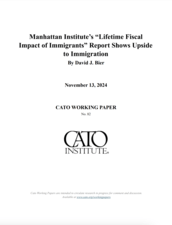In “The Lifetime Fiscal Impact of Immigrants” (2024), the Manhattan Institute (MI) constructed a sophisticated model to estimate the likely lifetime fiscal effect of new immigrants on the US federal budget. MI concludes that the average immigrant will be fiscally positive a modest $10,000 in present value over a lifetime but that immigrants without a bachelor’s degree will be extremely fiscally negative. MI projects that the recent increase in migration will cost the federal government over $1.1 trillion over a century.
A careful review of MI’s model finds that this result hinges on several unlikely assumptions, such as new arrivals causing large, immediate increases in defense spending, and no increase in corporate tax payments. When more realistic assumptions are adopted, MI’s model indicates that young, low-skilled immigrants will produce a positive lifetime contribution to the federal budget. For instance, the fiscal effect for a 22-year-old high school dropout changes from a negative $315,000 to a positive $45,000. After making revisions, including accounting for lower rates of benefits usage by immigrants, the model predicts the new group of unlawful entrants will likely be positive an aggregate $4.9 trillion.

